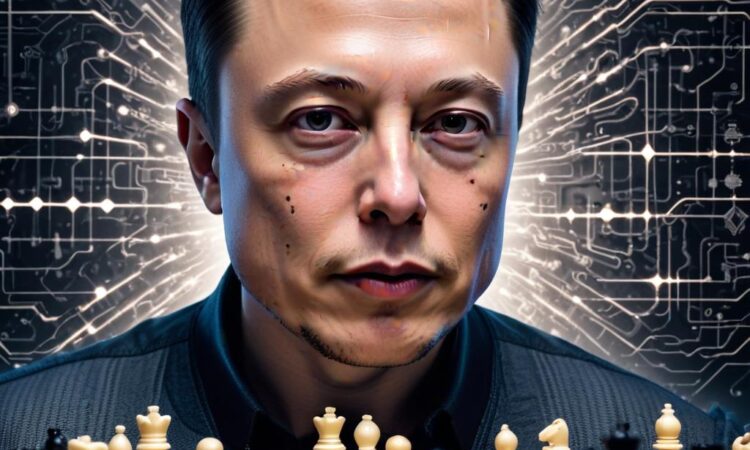Can Musk Damage OpenAI Even Though His Bid Has Failed? Experts Say His Real Goal is “Stymying” Its Growth Potential as His Own AI Ventures Flounder.
Elon Musk’s failed bid to regain control of OpenAI, the AI research company he co-founded, has left many wondering about his true intentions. While the bid’s failure is a significant event in itself, experts suggest that Musk’s actions may represent a broader strategy aimed at hindering OpenAI’s progress, potentially benefiting his own struggling AI ventures. The situation highlights the complexities of the competitive landscape in the rapidly evolving field of artificial intelligence.
Musk’s initial involvement with OpenAI was marked by a commitment to developing safe and beneficial artificial general intelligence (AGI). However, his departure in 2018, followed by his recent failed bid, suggests a shift in priorities. This shift is particularly intriguing given the simultaneous struggles faced by his own AI initiatives, including xAI, which have yet to achieve the same level of recognition and success as OpenAI.
The argument that Musk is attempting to “stymie” OpenAI’s growth rests on several key observations. Firstly, the timing of his bid coincides with a period of significant advancements in OpenAI’s capabilities, particularly with the release of highly successful models like GPT-4. This success directly challenges Musk’s own ambitions in the AI arena. A successful OpenAI would represent a formidable competitor, potentially eclipsing his own ventures in terms of market share, technological advancement, and investor interest.
Secondly, the nature of Musk’s bid, even in its failed state, can be interpreted as a strategic maneuver to disrupt OpenAI’s operations. The very act of launching a hostile takeover bid, regardless of its ultimate success, creates uncertainty and potentially disrupts ongoing projects, research collaborations, and internal dynamics. This disruption, even if temporary, could significantly impede OpenAI’s progress.
Experts point to Musk’s public criticisms of OpenAI, often couched in concerns about safety and ethics, as another indication of his underlying motives. While these criticisms may contain elements of genuine concern, their timing and intensity suggest a strategic element. By publicly questioning OpenAI’s approach, Musk sows doubt and potentially undermines public trust, impacting OpenAI’s reputation and investor confidence.
Furthermore, Musk’s extensive network and influence within the tech industry could be leveraged to indirectly hinder OpenAI’s growth. He might exert pressure on potential partners, investors, or talent, making it more difficult for OpenAI to secure necessary resources or attract top-tier expertise. This subtle form of influence can be just as effective as a direct, overt attempt to control the company.
The competitive landscape in the AI sector is fiercely competitive, with significant financial stakes and implications for the future of technology. OpenAI’s success poses a direct threat to Musk’s own AI ambitions, motivating him to pursue strategies, even indirect ones, to limit its growth. This underscores the inherent challenges in balancing collaborative innovation with the competitive pressures inherent in a rapidly growing and lucrative industry.
However, it’s crucial to acknowledge the counterarguments. Some might suggest that Musk’s actions are driven by genuine concerns about the ethical implications of AGI development, and his criticisms are sincere attempts to improve the safety and responsible use of AI technologies. Others might attribute his actions to a more general entrepreneurial drive to compete and dominate the market.
Regardless of the underlying motivations, the episode sheds light on the complexities of navigating the ethical and competitive dimensions of AI development. The potential for conflicts of interest, strategic maneuvering, and the blurring of lines between genuine concern and self-interest are all highlighted by Musk’s actions, demanding a nuanced understanding of the dynamics at play within the rapidly evolving AI landscape.
The situation underscores the need for robust regulatory frameworks and ethical guidelines to govern the development and deployment of AI technologies. Without clear rules and oversight, the competitive pressures of the industry could lead to actions that hinder progress and undermine the potential benefits of AI for society as a whole. The incident serves as a cautionary tale about the potential for conflicts of interest and the importance of transparency and accountability in the rapidly developing field of AI.
The long-term implications of Musk’s actions on OpenAI remain to be seen. However, the episode highlights the potential for strategic maneuvering and the complexities of competition in the AI space. Whether Musk’s actions will ultimately succeed in “stymying” OpenAI’s growth remains to be seen, but his failed bid reveals a deeper struggle for dominance in the rapidly evolving world of artificial intelligence.
Further research and analysis are needed to fully understand the implications of this situation and to develop effective strategies for fostering responsible innovation in the AI field. The ongoing debate surrounding Musk’s actions and their impact on OpenAI serves as a critical case study in the broader conversation about the ethical and economic dimensions of artificial intelligence development.
The unfolding events surrounding Musk, OpenAI, and the broader AI landscape underscore the urgent need for a comprehensive and nuanced approach to governing this powerful technology. The stakes are high, and the future of AI hinges on navigating these complex challenges responsibly and ethically.

